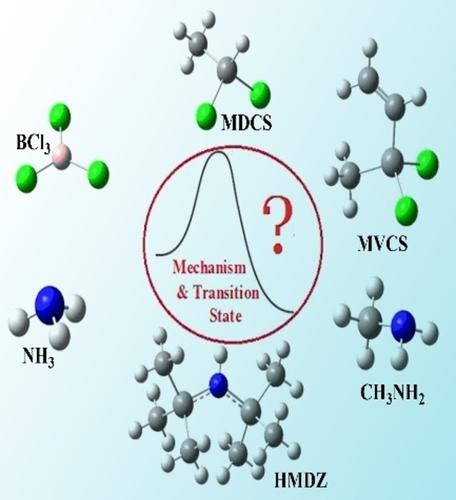当前位置:
X-MOL 学术
›
ChemistrySelect
›
论文详情
Our official English website, www.x-mol.net, welcomes your
feedback! (Note: you will need to create a separate account there.)
Theoretical Study on the Mechanism of the Initial Ammonolysis Reactions of the Main Raw Materials for the Formation of SiBCN Ceramics
ChemistrySelect ( IF 1.9 ) Pub Date : 2021-11-19 , DOI: 10.1002/slct.202102574 Ju Xie 1 , Huizhong Shi 1 , Yanwu Yang 1 , Ziqing Xi 1 , Jie Zhang 2 , Lubin Ni 1
ChemistrySelect ( IF 1.9 ) Pub Date : 2021-11-19 , DOI: 10.1002/slct.202102574 Ju Xie 1 , Huizhong Shi 1 , Yanwu Yang 1 , Ziqing Xi 1 , Jie Zhang 2 , Lubin Ni 1
Affiliation

|
In this work, quantum chemical calculations were used to study the ammonolysis mechanism among main raw materials for SiBCN ceramics. The compounds containing B−N, Si−N and C−N bonds can be formed through a synergistic reaction mechanism with the release of ammonium chloride or trimethylchlorosilane (TMCS). The ammonolysis processes of BCl3 have absolute advantages in both kinetics and thermodynamics. The reaction of methyldichlorosilane has the lowest energy barrier. All ammonolysis reactions are thermodynamically exothermic processes.

中文翻译:

SiBCN陶瓷主要原料初始氨解反应机理的理论研究
在这项工作中,量子化学计算被用来研究 SiBCN 陶瓷主要原材料之间的氨解机制。含有 BN、Si-N 和 CN 键的化合物可以通过协同反应机制与氯化铵或三甲基氯硅烷 (TMCS) 的释放形成。BCl 3的氨解过程在动力学和热力学上都具有绝对优势。甲基二氯硅烷的反应具有最低的能垒。所有氨解反应都是热力学放热过程。

更新日期:2021-11-19

中文翻译:

SiBCN陶瓷主要原料初始氨解反应机理的理论研究
在这项工作中,量子化学计算被用来研究 SiBCN 陶瓷主要原材料之间的氨解机制。含有 BN、Si-N 和 CN 键的化合物可以通过协同反应机制与氯化铵或三甲基氯硅烷 (TMCS) 的释放形成。BCl 3的氨解过程在动力学和热力学上都具有绝对优势。甲基二氯硅烷的反应具有最低的能垒。所有氨解反应都是热力学放热过程。
































 京公网安备 11010802027423号
京公网安备 11010802027423号